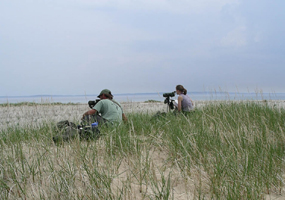If you enjoy birdwatching, you may be able to use your hobby to help protect an endangered Great Lakes shorebird.

Volunteers are needed to monitor the critically endangered piping plover, pictured above. Photo: Alice Van Zoeren
The U.S. Fish and Wildlife Service is relying on volunteers to monitor the critically endangered piping plover during its nesting season this summer, from May 1st to July 15th.
Patrols have already been established in Michigan national forest and state parks, including Sleeping Bear Dunes lakeshore.
Most remaining breeding pairs nest in Michigan — with the intensive patrol programs, the number of Great Lakes nesting plovers rose from 17 pairs in 1986 to 59 pairs in 2005, according to the National Park Service.
But numbers have dropped in recent years: 25 pairs in 2009, 23 pairs in 2010 and 18 pairs in 2011.
The Fish and Wildlife Service recently awarded a grant to the St. Louis River Alliance to monitor the birds in Great Lakes areas outside of Michigan.
The River Alliance is protecting plover populations in Minnesota and Wisconsin, said Kris Eilers, project coordinator for the Duluth-based organization.
“Last year was our first summer using volunteers to monitor piping plovers,” Eilers said. “But our work also involves restoring beach habitat and teaching the public about these very rare birds.”
The Great Lakes shores were once home to nearly 800 pairs of piping plovers, according the Fish and Wildlife Service. In 1986, the piping plover was placed on the Federal Register and listed as endangered.
“Piping plovers been suffering in numbers for a while,” she said. “They were hunted as early as the 1930s for their feathers, which were then used to make women’s hats.
“Now they’re losing their habitat because of urban development, and because they like to nest on popular beaches where people walk and bring their dogs,” Eilers said.
Patrol volunteers report sightings of adult plovers and eggs or chicks, raise public awareness of the birds and assist with habitat restoration.
“We’ve helped restore some beach habitat along Lake Superior, in a DNR-managed wildlife refuge in Wisconsin,” said Eilers. “Plovers like to nest on wide-open sandy beaches with no trees, so we had to recreate a desirable habitat.”
Last summer volunteers cleared a beach taken over by spotted knapweed, an invasive weed that threatens prairies, beaches and sand dunes, according to the Minnesota Department of Natural Resources.
Predation is another factor that prevents plovers from nesting, Eilers said.
The group set up heavy cables and fence posts on Lake Superior’s Shaffer Beach to keep gulls from landing on the beach, where they often eat piping plover eggs.

Volunteers watch for piping plovers along Lake Michigan. Photo: Alice Van Zoeren.
But Eilers said the biggest priority is education and outreach.
“We’d like people to stay away from the beaches where these birds like to nest, but we know it isn’t likely,” she said. “But there are a few things people can do what will really help.”
Eilers advised that during the nesting season, dogs should be kept on a leash. “The plovers lay their eggs right in the middle of the beach. Running dogs step on the eggs and chase newly hatched chicks,” she explained.
She also encourages beachgoers to pick up their garbage — trash attracts predators — and to simply walk near the waterline, where they’re less likely to harm piping plover eggs.
Who do I contact to become a trained volunteer to monitor Piping Plover populations along Lake Michigan in Manitowoc Co, WI? Thank you for any information! My email is henrbp29@gmail.com
There is a lady in Grand Marais that has been watching over the Plover nests in the area for decades. She has been dedicated and should really receive some recognition for her efforts.